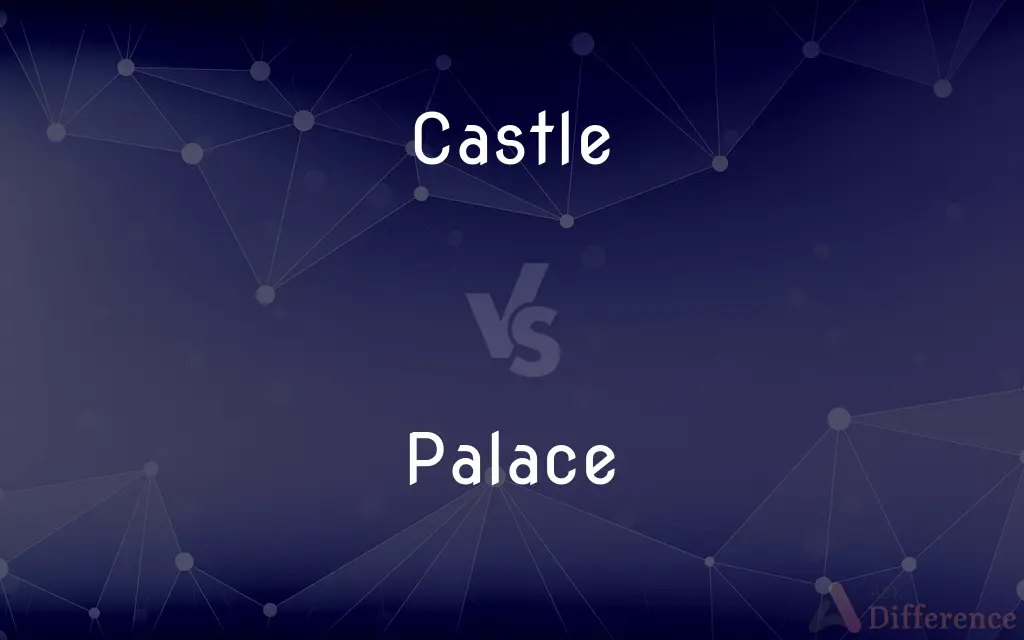Castle vs. Palace — What's the Difference?
Edited by Tayyaba Rehman — By Fiza Rafique — Updated on September 30, 2023
A castle is a fortified building designed for defense, often from the medieval era, while a palace is a grand residence, typically for royalty or nobility. Castles prioritize protection, palaces emphasize luxury.

Difference Between Castle and Palace
Table of Contents
ADVERTISEMENT
Key Differences
A castle, historically speaking, was constructed with a primary objective of providing protection. These structures often feature thick walls, moats, battlements, and drawbridges. Palaces, on the other hand, were constructed as symbols of wealth, status, and power. While they might have defensive elements, they are chiefly recognized for their opulence.
Many castles can be found dotting the European landscape, remnants from periods where invasions and feuds were common. Their architecture prioritizes strategic defense. Palaces, conversely, are more widespread and are often in city centers, showcasing grand architecture, expansive gardens, and intricate artwork.
It's worth noting that not all castles were built solely for defense; some also served as residences. However, the residential areas in a castle would still be built with security in mind. In contrast, every feature of a palace—from its vast halls to its ornate chambers—was designed for comfort, entertainment, and to impress visitors.
Castles often have a reputation of being cold, dark, and damp due to their thick walls and strategic locations. Palaces, boasting large windows, luxurious interiors, and often situated in favorable climates, epitomize luxury living.
In literature and popular culture, castles are often associated with knights, battles, and sieges, highlighting their defensive nature. Palaces are frequently backdrop to tales of royal intrigue, grand balls, and lavish lifestyles, illustrating their association with wealth and power.
ADVERTISEMENT
Comparison Chart
Primary Purpose
Defense and protection
Residence of royalty or nobility
Architectural Features
Thick walls, battlements, moats
Grand architecture, luxurious interiors
Historical Period
Predominantly medieval
Throughout history, more recent than many castles
Common Locations
Strategically important locations, often on high ground
City centers or prime land
Associations
Knights, sieges, battles
Royalty, luxury, grand ceremonies
Compare with Definitions
Castle
A large fortified building or set of buildings.
The castle stood tall, overlooking the valley.
Palace
The official residence of a sovereign, archbishop, bishop, or other exalted person.
The queen resides in the palace during the summer.
Castle
A medieval stronghold, often the residence of a monarch.
The castle has withstood numerous sieges over the centuries.
Palace
A place of entertainment or public spectacle.
The downtown movie palace was ornately decorated.
Castle
A refuge or stronghold against potential attack.
The small town considered the mountain as their natural castle.
Palace
The residence of various high-ranking church dignitaries or members.
The cardinal lived in the palace adjacent to the cathedral.
Castle
A castle is a type of fortified structure built during the Middle Ages predominantly by the nobility or royalty and by military orders. Scholars debate the scope of the word castle, but usually consider it to be the private fortified residence of a lord or noble.
Palace
A palace is a grand residence, especially a royal residence, or the home of a head of state or some other high-ranking dignitary, such as a bishop or archbishop. The word is derived from the Latin name palātium, for Palatine Hill in Rome which housed the Imperial residences.
Castle
A large fortified building or group of buildings with thick walls, usually dominating the surrounding country.
Palace
The official residence of a royal personage or other high dignitary.
Castle
A fortified stronghold converted to residential use.
Palace
A large or splendid residence.
Castle
A large ornate building similar to or resembling a fortified stronghold.
Palace
A large, often gaudily ornate building used for entertainment or exhibitions.
Castle
A place of privacy, security, or refuge.
Palace
Official residence of a head of state or other dignitary, especially in a monarchical or imperial governmental system.
Castle
(Games) See rook2.
Palace
A large and lavishly ornate residence.
Castle
To move the king in chess from its own square two empty squares to one side and then, in the same move, bring the rook from that side to the square immediately past the new position of the king.
Palace
A large, ornate public building used for entertainment or exhibitions.
Castle
To place in or as if in a castle.
Palace
(archaic) To decorate or ornate.
Castle
(Games) To move (the king in chess) by castling.
Palace
The residence of a sovereign, including the lodgings of high officers of state, and rooms for business, as well as halls for ceremony and reception.
Castle
A large residential building or compound that is fortified and contains many defences; in previous ages often inhabited by a nobleman or king. Also, a house or mansion with some of the architectural features of medieval castles.
Palace
The official residence of a bishop or other distinguished personage.
Castle
(chess) An instance of castling.
Palace
Loosely, any unusually magnificent or stately house.
Castle
A rook; a chess piece shaped like a castle tower.
Palace
A large and stately mansion
Castle
(shogi) A defense structure in shogi formed by defensive pieces surrounding the king.
Palace
The governing group of a kingdom;
The palace issued an order binding on all subjects
Castle
(obsolete) A close helmet.
Palace
A large ornate exhibition hall
Castle
(dated) Any strong, imposing, and stately palace or mansion.
Palace
Official residence of an exalted person (as a sovereign)
Castle
(dated) A small tower, as on a ship, or an elephant's back.
Palace
A large, splendid house.
His new mansion looked like a modern palace.
Castle
The wicket.
Palace
A place of luxurious dwelling or of richly endowed institutions.
The artist’s loft was his personal palace of creativity.
Castle
(transitive) To house or keep in a castle.
Castle
To protect or separate in a similar way.
Castle
(obsolete) To make into a castle: to build in the form of a castle or add (real or imitation) battlements to an existing building.
Castle
To move the king 2 squares right or left and, in the same turn, the nearest rook to the far side of the king. The move now has special rules: the king cannot be in, go through, or end in check; the squares between the king and rook must be vacant; and neither piece may have been moved before castling.
Castle
To create a similar defensive position in Japanese chess through several moves.
Castle
(cricket) To bowl a batsman with a full-length ball or yorker such that the stumps are knocked over.
Castle
A fortified residence, especially that of a prince or nobleman; a fortress.
The house of every one is to him castle and fortress, as well for his defense againts injury and violence, as for his repose.
Our castle's strengthWill laugh a siege to scorn.
Castle
Any strong, imposing, and stately mansion.
Castle
A small tower, as on a ship, or an elephant's back.
Castle
A piece, made to represent a castle, used in the game of chess; a rook.
Castle
To move the castle to the square next to king, and then the king around the castle to the square next beyond it, for the purpose of covering the king.
Castle
A large and stately mansion
Castle
A large building formerly occupied by a ruler and fortified against attack
Castle
(chess) the piece that can move any number of unoccupied squares in a direction parallel to the sides of the chessboard
Castle
Interchanging the positions of the king and a rook
Castle
Move the king two squares toward a rook and in the same move the rook to the square next past the king
Castle
A chess piece shaped like a tower.
She moved her castle two squares forward.
Castle
A complex and imposing structure.
The CEO's office was in the main castle of the corporate campus.
Common Curiosities
Are all castles historical structures?
Most are, but some modern buildings mimic castle architecture for aesthetic reasons.
Can a palace have defensive structures?
Yes, but its primary purpose is luxury, not defense.
Are all castles homes to royalty?
No, many were residences of nobles or military fortifications.
Were castles always built of stone?
Stone was common for durability, but some early castles were wooden.
Why do castles often sit on hills?
Elevated locations provide strategic advantages for defense and visibility.
Can anyone live in a palace today?
Typically, palaces are for royalty or heads of state, but some are hotels or museums.
Are castles exclusive to Europe?
No, while common in Europe, other regions have similar fortified structures.
Are palaces always larger than castles?
Not necessarily; size varies, but palaces emphasize grandeur and opulence.
Do all countries have palaces?
Most have, historically. They may serve as museums or official residences today.
Do palaces always belong to the state?
Often, but some belong to private individuals or religious institutions.
Share Your Discovery

Previous Comparison
Deoxyribose vs. Ribose
Next Comparison
Cafe vs. RestaurantAuthor Spotlight
Written by
Fiza RafiqueFiza Rafique is a skilled content writer at AskDifference.com, where she meticulously refines and enhances written pieces. Drawing from her vast editorial expertise, Fiza ensures clarity, accuracy, and precision in every article. Passionate about language, she continually seeks to elevate the quality of content for readers worldwide.
Edited by
Tayyaba RehmanTayyaba Rehman is a distinguished writer, currently serving as a primary contributor to askdifference.com. As a researcher in semantics and etymology, Tayyaba's passion for the complexity of languages and their distinctions has found a perfect home on the platform. Tayyaba delves into the intricacies of language, distinguishing between commonly confused words and phrases, thereby providing clarity for readers worldwide.
















































